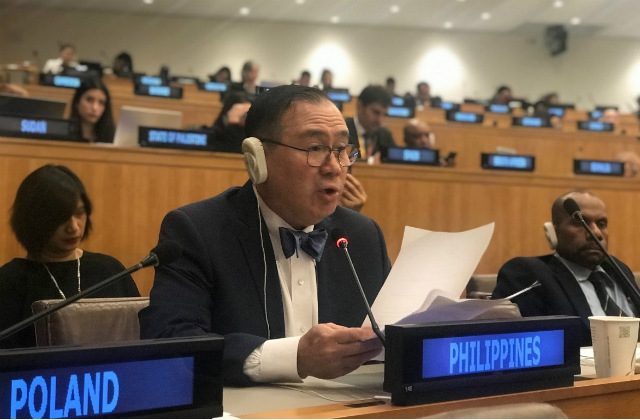SUMMARY
This is AI generated summarization, which may have errors. For context, always refer to the full article.

MANILA, Philippines (UPDATED) – Foreign Secretary Teodoro “Teddyboy” Locsin Jr raised at the United Nations (UN) the sinking of a Filipino boat by a Chinese ship in the West Philippine Sea (South China Sea), as he slammed the “felony” of abandoning persons in distress.
“The 22 Filipino crew were left in the water until a Vietnamese vessel took them on board. We are eternally grateful, we are eternally in debt to our strategic partner, Vietnam, for this act of mercy and decency,” said Locsin in a speech Monday evening, June 17 (Manila time), at the UN Headquarters in New York. (READ: INSIDE STORY: How Filipino crew were saved by Vietnamese in West PH Sea)
Locsin was speaking at the commemoration of the 25th anniversary of the entry into force of the UN Convention on the Law of the Sea (UNCLOS).
The UNCLOS is the basis of the Philippines’ legal victory against China, which nullified China’s expansive claim over the South China Sea. The ruling upheld the Philippines’ rights over the West Philippine Sea, including the potentially oil-rich Recto Bank (Reed Bank), the site of the boat sinking incident.
Locsin delivered his UN speech hours after the country’s chief diplomat, President Rodrigo Duterte, dismissed the boat sinking at Recto Bank as a “maritime incident.” Duterte also spared China from criticism when he broke his days-long silence on this.
Locsin’s speech further showed the Philippine government’s two-faced response to the Recto Bank incident, as officials excuse or downplay China’s acts in public, while diplomats, behind the scenes, alert the international community in fora such as this UN event and also a meeting at the International Maritime Organization (IMO) in London.
Locsin at one point tweeted “fuck the international community” in response to this issue, only for the Philippines to raise the incident at the IMO in a formal speech a day later.
‘Duty to render assistance’
In his speech on Monday, Locsin said the boat sinking incident “to put it diplomatically, highlights the moral and possibly legal – though one wouldn’t bet on it – imperative of coming to the rescue of persons in distress at sea.”
He cited Article 98 of UNCLOS, which “explicitly provides for the ‘duty to render assistance.'”
He noted the 3-fold duty of the master of a ship:
- “to render assistance to any person found at sea in danger of being lost”
- “to proceed with all possible speed to the rescue of persons in distress, if informed of their need of assistance, in so far as such action may reasonably be expected of him:
- “after a collision, to render assistance to the other ship, its crew and its passengers and, where possible, to inform the other ship of the name of his own ship, its port of registry and the nearest port at which it will call”
He said the same “categorical imperative” is found in the International Maritime Organization (IMO) International Convention for the Safety of Life at Sea, as amended, and the IMO Convention on Maritime Search and Rescue “to which we have appealed.”
‘It is a felony’
“It is the obligation of every member state of the UN and of the IMO to pay not just lip service to these conventions, but to observe them in real life-and-death situations,” Locsin said.
He added: “The rescue of persons in distress is a universally recognized obligation of people and governments; and in the civil law and, maybe even in common law, it is a felony to abandon people in distress; especially when we cause that distress; and more so when it is no bother at all to save them at no risk to oneself. While no sanction is available in international law, it should be a cause of some concern.”
Locsin also made a veiled tirade against the United States, which has not ratified UNCLOS unlike the Philippines and China.
“Whether international law can be enforced is another matter. And it doesn’t help that parties with the strength to enforce it – and who have invoked a lot the need for it – have not joined it,” the Philippines’ top diplomat said.
The Philippines’ lawyer in its case against China, Paul Reichler, earlier urged the US to ratify UNCLOS to pressure China to heed it. He said this is “a political argument, not a legal one.”
Explaining the Chinese point-of-view, Reichler said: “Why should they be bound by the convention; why should they have to comply with it, when the United States – which is a great power and asserts important strategic interests in the South China Sea, and has pivoted in that direction – when the United States is free of it, and doesn’t have to comply with it? Why should China be subject to different rules than the United States?”
Reichler clarified his views in an email to Rappler on Friday, June 21.
Referring to UNCLOS, Reichler said, “Of course, China is bound by those rules, because it voluntarily chose to accept them when it ratified the Convention.”
“The US was not a party when China ratified, so it is clear that China accepted the rules while knowing that the US did not. As a legal matter, China cannot justify its violations of the Convention by arguing the the US is not a party,” Reichler said. – Rappler.com
Add a comment
How does this make you feel?
There are no comments yet. Add your comment to start the conversation.